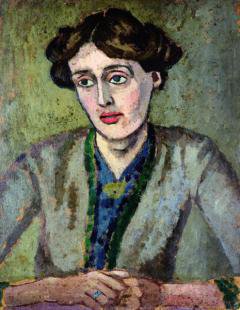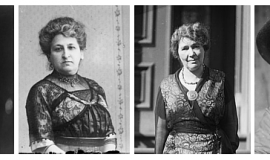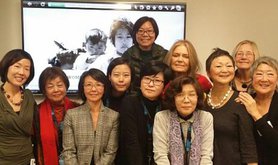
A portrait of Woolf by Roger Fry c.1917
How essential it is that we should realize that unity the dead bodies, the ruined houses prove. For such will be our ruin if you, in the immensity of your public abstractions forget the private figure, or if we, in the intensity of our private emotions forget the public world.’ (Virginia Woolf, Three Guineas)
There appears to be something missing in coverage of the UK General Election: war and peace. It’s understandable, given the recession and subsequent cuts, that the nation’s everyday suffering is in full focus, but watching the news you’d be forgiven for thinking that Britain is not in fact a military force with the power of life and death over thousands of women, men and children.
Both the current Conservative-Liberal Democrat coalition government and the Labour opposition seek to replace our nuclear missile system, Trident, for £100 billion (the same money could fund 1.5 million affordable homes, or see 4 million students through university). Meanwhile, as some 900 more refugees died in the Mediterranean last week, we were reminded that it was the UK Government that cruelly withdrew funding for search and rescue missions. Iraq Body Count tells us that post-military intervention, civilian deaths are almost doubling year on year. A documented 137,248 - 155,338 civilians have died from violence since the bloody conflict began in 2003, 211,000 including combatants. The prevalence of violence is also bleak domestically: two women still die each week because of violence from a former or current male partner.
I carry this burden heavy on my shoulders as I head to The Hague today to report, with openDemocracy 50.50, on the centenary conference of the Women’s International League for Peace and Freedom. ‘We still live in a world where women’s voices and experiences are excluded, bringing continued violence and war’ reads the programme.
I’ve just reread Virginia Woolf’s iconic essay, Three Guineas, and it’s made me hopeful for the event. It conjures up another image of politics, one in which the private and public spheres speak to each other. One in which the imagination can make the leap to see how struggles at home are linked to struggles abroad. It’s not just me, there’s a buzz among women’s peace activists in Britain since recent TV debates showed for the first time three women party leaders speak against nuclear weapons, environmental degradation and xenophobia. There’s a common sense that we might be moving forward if only more women could ‘get in’. 9.1 million women failed to vote in the last election. That’s one million women for each decade of freedom since women first won suffrage. Meanwhile, just 22% of MPs are women.
How can we convince women, in this context, of their power to change politics, stop war and forge new avenues for peace?
Going back to Virginia Woolf is not an obvious choice. At a time when social media has taken centre stage it can feel indulgent to go back to the past in search of inspiration. Meanwhile Woolf has fallen out of fashion. Although some young feminists still read her 1929 essay, A Room of One’s Own, many ask, what can her white, upper class, dated perspective contribute to the intersectionality of modern feminism?
There are three main lessons that I take away from Woolf’s essay which inspire me as a peace activist some 77 years on from its 1938 publication. The first relates to the relationship between culture, capital and war; the second to women’s private and public experience of conflict and oppression; and the third to the relationship between conflict and patriotism. The essay reminds us that war cannot be stopped by the international actors alone, but requires a systematic shift in discourse and power in democracy domestically as well as abroad.
Culture, capital and war
In 1920, Woolf wrote in her diary that her ‘generation [was] daily scourged by the bloody war’. The question that she seeks to answer in Three Guineas, many years on, is how are we to prevent war? She begins by locating the ubiquity of war in a society dominated by oppressive ideas of masculinity and commodity. Everywhere men are in power and the perspectives of women – rendered different by their experience of societal marginalisation – are ignored.
Tackling culturally imposed grandiose ideas of manliness is at the core of Woolf’s message for peace. Her analyses of the media, run by capitalist tycoons who have an interest in maintaining conflict and competition, is highly poignant for today’s feminist audience. She captures the power of discourse, arguing that reclaiming the media from the monocles of the super-rich is imperative to restoring independent thought. Throughout the essay Woolf takes us back time and time again to a newspaper image of the Spanish Civil War, of corpses so badly mutilated they are undiscernible as man, woman or pig. We are conditioned to see that as justification for war, she explains, but a different sensibility has been repressed by patriarchy. Similar debates continue to surface, as in relation to recent media coverage of ISIS.
Yes, the culture of war remains dominant in today’s society, in our schools and in the public sphere. Though the British Empire has formally fallen, what Woolf calls its ‘commodifying attitude’ is now at the ‘helm of modern capitalism’. Anticipating strategies of current activism against neoliberalism, she calls for public divestment from the arms trade. More money should instead be channelled into funding for women’s organisations, she argues. This is a universal dilemma, for ‘money makes it possible to speak without fear or flattery.’
Woolf also answers a key dilemma of the modern feminist movement. At a time when we are telling young girls to ‘lean in’, how can women succeed in public institutions and in politics without becoming part of the dominant culture? ‘We too can leave the house, wear wigs and gowns, make money, administer justice’, as she puts it, ‘but on what terms shall we join that procession?’
In Woolf’s universe, enfranchising women is an opportunity to reinvent the institutions according to a different logic, of collaboration and peace rather than of competition and conflict. ‘We can best help you to prevent war’, she tells men, ‘not by repeating your words and following your methods but by finding new words and creating new methods’.
Conflict in private and public spheres
By linking women’s domestic struggles to become educated and earn a living to the cause of challenging war, Woolf makes an explicit link between the private and the public spheres. For her, fighting for a living wage and paid care work are all part of the peace movement, a plan for enhancing democracy and liberty in the face of oppression and dictatorship. ‘To help women to earn their livings...’, she explains, ‘is to help them to possess that weapon of independent opinion which is still their most powerful weapon. It is to help them to have a mind of their own and a will of their own which will help you to prevent war’.
Although it is now widely recognised that women and men experience conflict and peace differently, as spelled out in instruments such as CEDAW, at the time of writing Woolf was bold to put the social segregation of men and women at the heart of her analysis. In 1938 the navy and army were closed to women, as were the diplomatic service, clergy and the stock exchange. Woolf felt, as many others have, that this exclusion from public life gave women an advantage to see a ‘new world’ free from the ‘untrue loyalties’ imposed on men in the public sphere.
Woolf also draws on poetry by Wilfred Owen on the ‘unnaturalness of weapons’ and the ‘foolishness of war’ to explore how men experience war in different ways, challenging the idea of ‘the ideal solider’. And women too, she explains, are embroiled in propagating ideas of military masculinity. ‘Give not the white feather of cowardice not the red feather of courage, but no feather at all’, she asks us. One can imagine that Woolf would have been an avid contributor to the Everyday Sexism project, because she saw the culture of violence as very much an assemblage of everyday experiences.
Patriotism and war
Women’s ‘Outsider perspective’, contends Woolf, not only gives us a unique vision of what peace might look like, but allows us to empathise with the oppression of others. ‘Those who would keep women in the home are no better than Dictators’, she decries. In a particularly bold passage, she asserts that ‘the monster has widened his scope’, tracing a historical genealogy of oppression that spans the family home and Nazi Germany.
It is the Outsider experience which prevents women from getting behind the patriotism of war and the duties of war. What does ‘our country’ mean to women as Outsiders, she asks. How much of England actually belongs to us? ‘Throughout the greater part, history has treated me as a slave’, she concludes, ‘...as a woman I have no country’. Ending war then, for Woolf, requires women and men to rid themselves both of ‘pride of nationality’ and the presumed ‘superiority of patriotism’.
In almost a century much has changed in the nature of war and peace in Britain and abroad, leaving us to wonder what relevance Woolf’s essay can still carry. Her letter, certainly, is remarkably forward-looking. She foresees many strategies of the women’s peace movement, from sex strikes, calls to ban Page 3 and pressure on public institutions to divest in arms and fossil fuels. Her work was also, and remains, instrumental in placing women’s, and to some extent men’s, lived experiences of war and peace at the heart of analysis.
As feminists we often struggle to articulate the dialectic between our work at the everyday and ideological levels. But what Woolf reminds us is that war will not end while women are kept out of power. And similarly, war will not end while power is governed on the same historic terms which men have established in the absence of half of society. Woolf concludes with a startling, leveling image. Under patriarchy, we are all, she posits, ourselves the figure of the uniformed soldier. Adopting this identity is a source of hope for Woolf, ‘it suggests that we are not spectators doomed to unresisting obedience, but by our thoughts and actions can ourselves change that figure’.
Jennifer Allsopp is reporting from WILPF's centenary international civil society conference in the Hague, 27-29 April. Read more articles in 50.50's series Women's Power to Stop War.
Read more
Get our weekly email




Comments
We encourage anyone to comment, please consult the oD commenting guidelines if you have any questions.